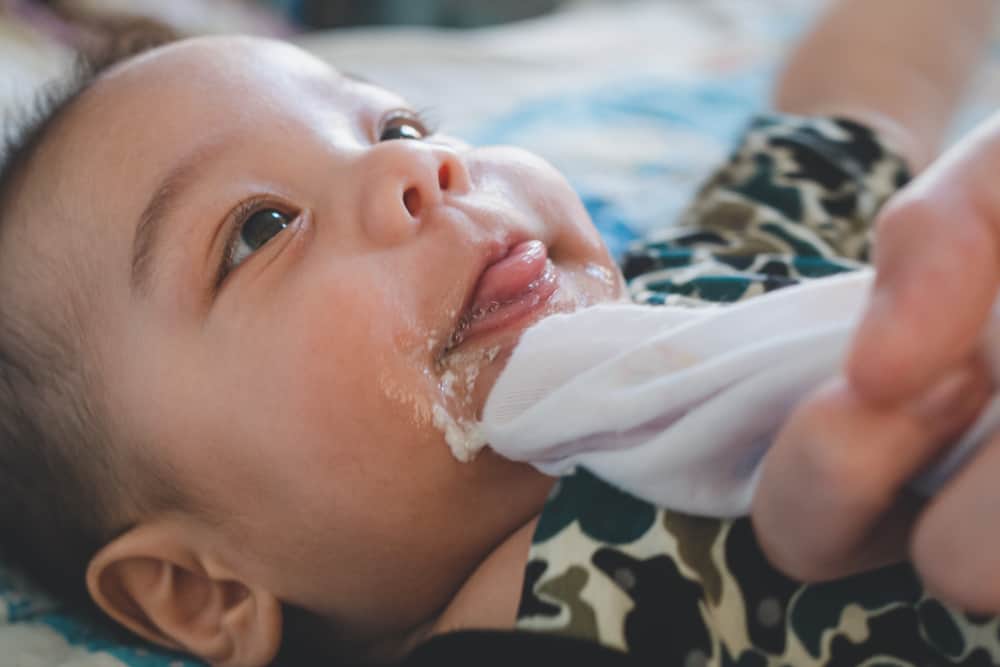Spit up is unique to babies, which can make it a bit of a mystery to grown adults. Especially for soon to be parents, who are usually left puzzled by the ‘bib-to-baby ratio’ that is often recommended online. But trust us, once your baby arrives, and your clothes, carpets, and hair get introduced to the wonder of baby spit up, you’ll be grateful you invested in those extra bibs.
In any case, as a parent, you want to know why your baby has just regurgitated their meal and at what point that becomes a problem. Here’s everything you need to know.
What Is Spit Up?
The technicalities of spit up are fairly straightforward. In essence, spit up is the contents of the baby’s stomach flowing back into the esophagus and out of their mouth, sometimes accompanied by a little burp.
Spit up is a form of gastrointestinal reflux, known in babies as infant reflux. Gastrointestinal reflux in adults is often accompanied by heartburn and discomfort. Fortunately, this is not the case for babies and spitting up is an effortless and painless event, causing absolutely no distress to your baby.
Spit up should have the same texture and creamy color as the milk or formula that your baby just consumed, particularly if the spit up comes soon after feeding. It’s not unusual for spit up to take up to two hours to appear after eating. By then, it will have spent some time interacting with the acid in the stomach and will have a slightly curdled appearance that there’s no need to worry about.
Is Spitting up Healthy?
Spitting up is a completely natural and almost always healthy part of your baby’s first year of life. All babies spit up at some point, with over half of all babies spitting up daily during the first three months.
Most babies are ‘happy spitters’ which means their spitting up is free from discomfort and has no effect on healthy weight gain. They’re also free from any breathing problems and have plenty of wet and dirty diapers. In fact, a happy spitter is often completely oblivious to the reappearance of their dinner.
One major risk is that parents confuse spit up with vomiting. While spit up is normal and healthy, vomiting is almost always dangerous for babies. This is why it’s essential that parents learn the differences between the two.

The Difference Between Spit up and Vomit
Vomiting can cause great distress to a baby. They will likely be fussy before and after and often have additional symptoms like diarrhea and a fever. Tell-tale signs of vomiting include contents shooting out of the mouth rather than dribbling, retching noises and a greenish tinge from the liver bile.
Vomiting may be a symptom of an infection, illness or blockage in the gastrointestinal tract and should always be checked out by a pediatrician. Especially since it can lead to dehydration which can be fatally dangerous for a young child.
In comparison, spitting up is very easy for a baby to do. Small amounts of spit up dribbles, almost casually, out of the baby’s mouth with no effort, pain or crying.
Why Do Babies Spit Up?
In mature gastrointestinal systems, the mouth leads to the esophagus, which is connected to the stomach via a ring of muscles known as the lower esophagus sphincter. The sphincter is a clever trap door that allows easy passage into the stomach, but blocks contents coming back out.
Babies’ digestive systems are immature at birth and need 6 months of growth time before their floppy sphincter begins to work reliably. Immature sphincters are still a saloon door, allowing milk to flow in and out of the stomach with ease.
Common Causes of Spitting Up
Until the gastrointestinal muscles form fully, there are a few key triggers that can cause a baby’s dinner to resurface.
Overeating
At three days old, your baby’s stomach is the size of a walnut, which translates to being able to hold only around 1 oz of milk at a time. As your baby grows, so does its stomach, but when your baby eats too much or too fast, their tiny tummy overfills, and the milk or formula makes its way back up the esophagus.
If a baby often seems to be eating too fast, it may be because the mom has a forceful let down reflux. This is when the milk flows out from the nipple too quickly for the baby and fills them up rapidly.
Food Sensitivities
It’s possible that excessive spit up is due to sensitivity or allergies to substances in the baby’s diet. One common problem is sensitivity to cow’s milk which is often found in baby formula but can also be transferred in breast milk if it is a part of mom’s diet.
Other sources of potential sensitivity in breast milk include vitamins, herbal preparations, supplements, or medications. As long as breastfeeding continues, the mother is still eating for two.
Swallowing Air
When a baby is feeling particularly hungry, they might approach their dinner with some gusto and begin guzzling their feed. In their ravenous state they can end up swallowing mouthfuls of air along with their food leading to gassy tummies. When this gas resurfaces, it has a habit of bringing the food back up with it.
Swallowing air can also be common for very young babies when the milk supply hasn’t adjusted to the baby’s needs. Breasts become full of milk and can harden which makes it difficult for the baby to latch onto the nipple properly, causing them to take in air accidentally.
Overstimulation
We all know the feeling of eating too much and having to wait out a food coma by sitting still with unbuttoned jeans. The same goes for your baby. Periods of high activity like bouncing, tummy time, or even tight diapers soon after eating are likely to cause spit up.
Will Your Baby Outgrow Spitting Up?
Spitting up can begin from your baby’s very first feed. Remember your baby’s walnut sized stomach can’t fit much milk or formula at all. Luckily, by around month 6 or 7, the gastrointestinal muscles strengthen enough to keep food inside.
Typically, spitting up peaks at around 2-4 months. Following this period, most parents see a decrease in spitting up as their baby begins to sit and start eating solid foods. However, it’s not unusual for spit up to continue until 1 years old, or even longer.
How to Reduce Spitting Up
Your baby will eventually grow out of spitting up, but it may take over a year for it to disappear completely. In the meantime, there a few tricks every parent needs to know that can help to reduce the amount of spitting up a baby does.
Keep Your Baby Upright
The early esophagus sphincter is so floppy that even gravity can cause it to swing open and allow stomach contents to flow out. To combat gravity, simply feed the baby in as much of an upright position as possible and keep them upright for at least 30 minutes after a meal.
Reflux tends to be more common when babies are placed onto their back after eating, whereas lying on the left side, or on the tummy in a prone position, reduces reflux episodes.
Babies should only be allowed in the prone position when they are awake and being watched. It can be a dangerous position for sleeping babies as it carries an increased risk of SIDS (sudden infant death syndrome).

Avoid Overfeeding
It can be difficult to simultaneously avoid overfeeding a baby while making sure your baby gets enough nourishment. The trick is to stick to the recommended quantity of milk per day, but to feed your baby smaller amounts, more frequently. However, make sure to wait at least 2.5 hours between each feed, that’s how long it takes for the stomach to empty.
If you and your baby are struggling with a strong let down, try nursing while reclining so that the milk isn’t streaming so readily into your baby’s mouth. Additionally, it can help to pump out excess milk before feeding which will soften the breast and allow your little one to latch on without any trouble.
Burp Your Baby
Burping your baby during and after each feeding can help you beat gas bubbles at their own game. Frequent burping throughout the meal helps to release any air swallowed during the feeding which can not only keep your baby comfy but also save you a change of clothes.
Experiment With Your Diet
If you’re suspicious that your baby may be sensitive to something in your diet, experiment by taking out common allergens one by one. Try a week without dairy to see if there is any difference in the frequency of spitting up episodes, followed by a week without caffeine. Eventually, you might be able to find and eliminate the source of your baby’s discomfort.
Free Baby’s Abdomen
Give your baby’s belly the freedom it needs to digest food properly after eating. Compression of your baby’s abdomen is likely to lead to another spit up! Avoid tight clothing and diapers, especially those with elasticated waistbands, and postpone tummy time until your baby’s food has gone down.
Thickening the Breast Milk
You may have come across the spit up ‘remedy’ that involves the thickening of breast milk or formula with rice or oats. This somewhat popular practice is known as thickening the feed and many insist that it is a miracle cure for spitting up in babies.
It’s true that thickened feeds result in reduced spit ups. However, it doesn’t cause a decrease in reflux. This simply means that the stomach contents only reach as far as the esophagus before being re-swallowed. While thickened breast milk may be beneficial to parents and their laundry loads, the babies are experiencing increased bouts of coughing, increased reflux episodes and a decrease in the time it takes for the stomach to empty.
The general rule is to never add anything to your baby’s feed without consulting a doctor first, especially before they begin transitioning to solid foods. There are some rare occasions, when spitting up becomes part of a more serious medical problem, that your doctor will guide you on.
When Does Spit up Become a Problem?
Spitting up will be a harmless activity for the majority of babies. However, it’s possible for reflux to lead to discomfort and a condition called GERD (gastro-esophageal reflux disease) which affects less than 1% of babies.
These poor babies suffer from heartburn in the lower esophagus and frequent gagging or choking. A doctor is likely to prescribe heartburn medication to manage symptoms until the baby grows out of it.
Potential signs of GERD to look out for in babies include an increase in the recurrence of spit ups past the age of 4 months, larger amounts of spit up, a tired or sluggish baby, or a baby who doesn’t appear to be gaining weight. These are all serious symptoms and your baby should be taken to the doctor to be checked out as soon as possible.
Large amounts of spit up can be hard to judge as even a little spit up can be a lot to clean up. However, if your baby is spitting up more than 1 or 2 teaspoons after eating, it is worth taking them to a pediatrician to get them checked out.
Final Thoughts
Spitting up is one of those things that babies just do.
It is a harmless, nonchalant activity that almost never cause for concern. But if you do need reassurance, we’ve provided a checklist of symptoms to look out for, above.
Even if you follow our tips to reduce the amount of spit up, your baby will inevitably spend the first year of their life spitting up their dinner, so it’s best to get the bibs ready.
